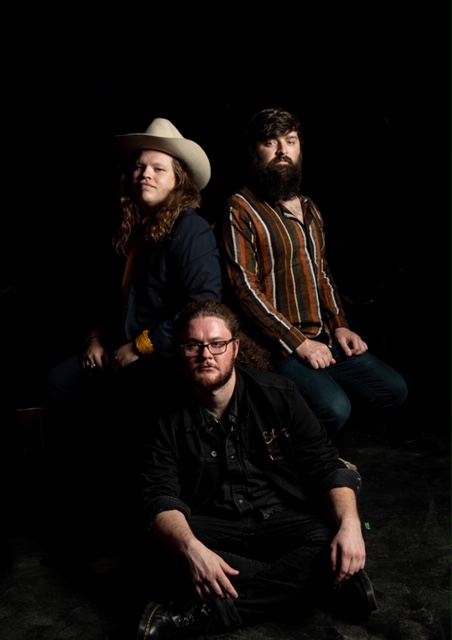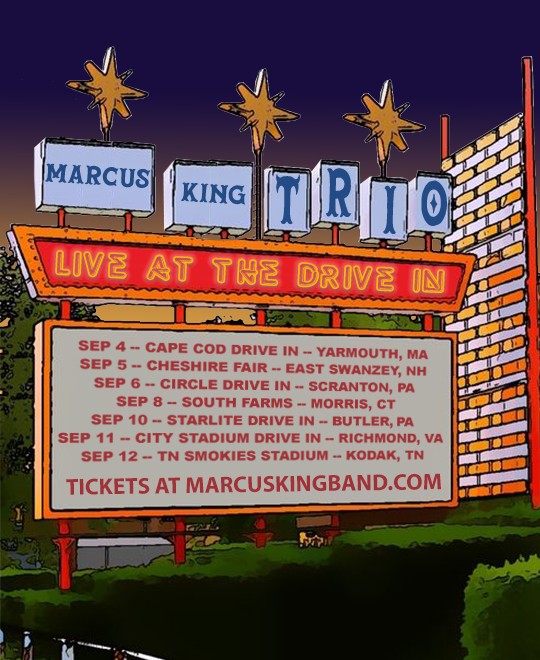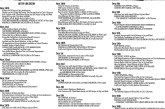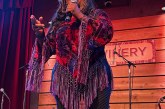
The last time Marcus King and the band that bears his name played East Tennessee, they lit up The Bijou Theatre with a taste of what fans could expect when his debut album, “El Dorado,” would drop a little more than a month later.
It was a Thursday night in early December, and COVID-19 still was a problem plaguing only distant shores. King’s star was on the rise, and the venue was sold out. Always a plum choice for musicians with a rootsy bent, the Bijou became an impromptu staging ground, King remembers, for spur-of-the-moment decision-making.
“I remember that being a really special one because we played some brand-new material that night against the band’s will,” King says, chuckling. “Sometimes the crowd feels so good you just want to try something brand new and go off script.”
He’s joking, of course; the other guys who make up the Marcus King Band are just as integral to the music as its namesake. And after years of toiling away on a shoestring budget, playing 200 dates a year at a level where the only meal in a day might come from venue owners who took pity on the hungry boys, they’ve become a crackerjack unit that never fails to rise to the occasion.
“Me saying ‘go off script’ could mean any number of things with these guys,” King explains. “We base the whole performance around dancing on that line of together and sporadic. Going off script could mean not playing the setlist in order or playing something we’ve never tried before. We know each other really well, and that chemistry is built off the stage: sharing meals together and, in our case, sharing beds together before we could afford separate [hotel] rooms.”
That hard work, he adds, has made surviving the ongoing COVID-19 pandemic, which has upended the music industry, a little more bearable. The son of South Carolina bluesman Marvin King, Marcus was something of a child prodigy on the six-string, and by the time he was 8 years old, he was playing with his dad’s band. By the time he was a teenager, the Marcus King Band was playing around the Greenville area, gelling as a unit and staking out a name as purveyors of “soul-influenced psychedelic Southern rock.”
By the time they hit the road, his experience allowed him to keep a cool head on his shoulders when it came to planning for the future.
“We set ourselves up in a position of having a good failsafe in place by how hard we toured in the earlier days,” he says. “We weren’t frivolous with our money. We were very driven and headstrong, and we built up a reputation for ourselves that allowed us, at this point, to not be concerned about people forgetting about us during this time.”
Not that there’s much cause for concern on that front. King’s been making waves regionally since he was a kid, and by the time he was in his late teens, he had already attracted the attention of Warren Haynes of Gov’t Mule and the Allman Brothers Band. The Marcus King Band debuted with “Soul Insight” in 2015, followed it up a year later with a Haynes-produced self-titled record and put out “Carolina Confessions” in 2018. All three albums landed in the Top 10 of the Billboard Blues Albums chart, mostly because that was the easiest touchstone to hit a fluid player like King, who spent his formative years studying classic players like Duane Allman and Stevie Ray Vaughan and Jimi Hendrix.
But, he adds, they were just a small part of a host of influences that might not seem immediately apparent.
“For me, and I don’t know if it’s necessarily a unique quality to have as a guitar player, but I’ve been uninterested in guitar playing,” he says. “I was always interested in anything that makes it not sound like the instrument in hand. I feel like just confining yourself to one particular instrument narrows your musical sensibility, and while the guitar is the instrument I know I’m well-versed in and can express myself through melodically, my influences came from all over the place: Aretha Franklin, pedal-steel players, organ players, saxophone players like Sonny Rollins and John Coltrane.
“And this was also after I had kind of listened to every Stevie Ray Vaughan and Hendrix and Robin Trower and Duane Allman record I could get my hands on. But in the end, I didn’t want to sound like a watered-down version of them – I wanted to sound like me.”
To that end, he studied jazz theory and learned to treat the guitar as an extension of his spirit rather than just a tool to make noise. Sure, he can throw down with the same sort of bluesy thunder as his musical forebears, but at 24 years old, he possesses an understanding of how to get to that place he explores so majestically on “El Dorado” that players twice his age don’t have.
That’s something King doesn’t take for granted because he is as humble as he is talented.
“Man, I always saw it as a blessing, primarily for the reason of being able to say most, if not all, of what I wanted to say musically,” he says. “What I did later on was I tried to apply a better vocabulary to what I was trying to say with the guitar by doing things like studying jazz theory, but there was never a definitive moment for me with playing. I always knew that if I wanted to say something louder than words, the instrument was going to be my tool and my microphone, as well. I just always kind of knew this was what I should do.”
That passion is etched into the line of every open-mouthed, eyes-closed moment of zen that King brings to the stage. The sounds that emanate from his instrument seem otherworldly exotic at times – unlike traditional form and more akin to the vocal ranges of the singers he appreciates so much. There’s a reason for that, he says: It’s the sound of a guy reaching down into the deepest parts of himself and putting it on display for the world to hear.
“Music is the purest form of expression to me because it gets ahold of things that words can’t say for us, and that’s where I kind of go with it,” he says. “I sort of get into transcendental meditation, but instead of focusing on my breathing, I’m focusing on the neck of that guitar. It’s the purest form of concentration because I’m not thinking on anything else around me, and it’s my release for the day.
“Being on the road as bandleader and owner of the brand, it can become a headache. There are a lot of things you have to sign off on; setlists to be written; meeting with people; interviews. It’s not that I don’t like doing those things, but it’s just that there’s so much to do, by the time you get to the stage, that’s the only way I can give the audience all of me.”
And there for a while, after the release of “El Dorado” and looking at a concert calendar that had him globe-hopping to support the record, even that seemed more difficult to do. To that end, COVID-19 has proven to be a reset button, he says, allowing him to take a step back and evaluate his career for what it is: the opportunity to make a living doing what he loves. And that, he says, will make his “Live at the Drive-In” tour, which comes to Smokies Stadium in Kodak on Sept. 12, all the sweeter.
“It’s exciting to be getting back to it,” he says. “I’ve been deprived of what I love, but then again, what I love kind of became my job for a while. I became a guy without a hobby – that guy that’s just married to his job or his work. And that was conflicting for me because music was my first love, and then it kind of became my career.”
He hasn’t been completely withdrawn from music, though. Last month, the band performed a four-night livestream which raised roughly $80,000 for MusiCares, the nonprofit arm of The Recording Academy that helps musicians in need. He also has been especially active helping those affected both physically and economically by COVID-19 – but it’s high time to get back to doing what he loves, he says.
And, he adds, he took his cue from comedian Bert Kreischer.
“I’m a big fan of comedy because most musicians, when we get offstage, the last thing we want to listen to is more music,” King says. “I knew Bert did a drive-in run, so we checked out what he was doing, and it seemed really safe. Everybody was in their car, and it seemed like the safest way to do it, so I pitched the idea to my team.
“Right now, we’re taking the trio out and testing it out, and hopefully down the line, we’ll bring the full band out and play music again. But the main thing right now is that I can get back to it after it being taken away from me. And now, I see it as that true love of mine again.”
Tickets to Marcus King’s Drive In Concert at Smokies Stadium are sold out, but tickets to other events for the series remain. They can be found here.








